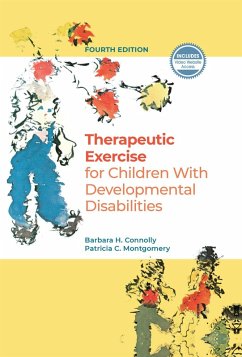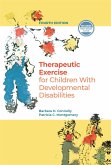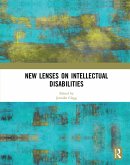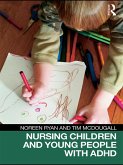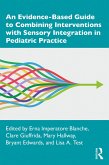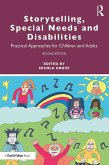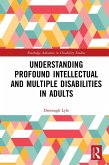Barbara H. Connolly, Patricia Montgomery
Therapeutic Exercise for Children with Developmental Disabilities (eBook, ePUB)
82,95 €
82,95 €
inkl. MwSt.
Sofort per Download lieferbar

41 °P sammeln
82,95 €
Als Download kaufen

82,95 €
inkl. MwSt.
Sofort per Download lieferbar

41 °P sammeln
Jetzt verschenken
Alle Infos zum eBook verschenken
82,95 €
inkl. MwSt.
Sofort per Download lieferbar
Alle Infos zum eBook verschenken

41 °P sammeln
Barbara H. Connolly, Patricia Montgomery
Therapeutic Exercise for Children with Developmental Disabilities (eBook, ePUB)
- Format: ePub
- Merkliste
- Auf die Merkliste
- Bewerten Bewerten
- Teilen
- Produkt teilen
- Produkterinnerung
- Produkterinnerung

Bitte loggen Sie sich zunächst in Ihr Kundenkonto ein oder registrieren Sie sich bei
bücher.de, um das eBook-Abo tolino select nutzen zu können.
Hier können Sie sich einloggen
Hier können Sie sich einloggen
Sie sind bereits eingeloggt. Klicken Sie auf 2. tolino select Abo, um fortzufahren.

Bitte loggen Sie sich zunächst in Ihr Kundenkonto ein oder registrieren Sie sich bei bücher.de, um das eBook-Abo tolino select nutzen zu können.
Therapeutic Exercise for Children With Developmental Disabilities has been expanded and updated to include everything a student or professional needs to know when working with children with developmental disabilities.
- Geräte: eReader
- ohne Kopierschutz
- eBook Hilfe
- Größe: 4.27MB
Andere Kunden interessierten sich auch für
![Therapeutic Exercise for Children with Developmental Disabilities (eBook, PDF) Therapeutic Exercise for Children with Developmental Disabilities (eBook, PDF)]() Barbara H. ConnollyTherapeutic Exercise for Children with Developmental Disabilities (eBook, PDF)82,95 €
Barbara H. ConnollyTherapeutic Exercise for Children with Developmental Disabilities (eBook, PDF)82,95 €![New Lenses on Intellectual Disabilities (eBook, ePUB) New Lenses on Intellectual Disabilities (eBook, ePUB)]() New Lenses on Intellectual Disabilities (eBook, ePUB)40,95 €
New Lenses on Intellectual Disabilities (eBook, ePUB)40,95 €![Nursing Children and Young People with ADHD (eBook, ePUB) Nursing Children and Young People with ADHD (eBook, ePUB)]() Noreen RyanNursing Children and Young People with ADHD (eBook, ePUB)28,95 €
Noreen RyanNursing Children and Young People with ADHD (eBook, ePUB)28,95 €![The Routledge International Handbook of Children's Rights and Disability (eBook, ePUB) The Routledge International Handbook of Children's Rights and Disability (eBook, ePUB)]() The Routledge International Handbook of Children's Rights and Disability (eBook, ePUB)45,95 €
The Routledge International Handbook of Children's Rights and Disability (eBook, ePUB)45,95 €![An Evidence-Based Guide to Combining Interventions with Sensory Integration in Pediatric Practice (eBook, ePUB) An Evidence-Based Guide to Combining Interventions with Sensory Integration in Pediatric Practice (eBook, ePUB)]() An Evidence-Based Guide to Combining Interventions with Sensory Integration in Pediatric Practice (eBook, ePUB)36,95 €
An Evidence-Based Guide to Combining Interventions with Sensory Integration in Pediatric Practice (eBook, ePUB)36,95 €![Storytelling, Special Needs and Disabilities (eBook, ePUB) Storytelling, Special Needs and Disabilities (eBook, ePUB)]() Storytelling, Special Needs and Disabilities (eBook, ePUB)31,95 €
Storytelling, Special Needs and Disabilities (eBook, ePUB)31,95 €![Understanding Profound Intellectual and Multiple Disabilities in Adults (eBook, ePUB) Understanding Profound Intellectual and Multiple Disabilities in Adults (eBook, ePUB)]() Dreenagh LyleUnderstanding Profound Intellectual and Multiple Disabilities in Adults (eBook, ePUB)40,95 €
Dreenagh LyleUnderstanding Profound Intellectual and Multiple Disabilities in Adults (eBook, ePUB)40,95 €-
-
-
Therapeutic Exercise for Children With Developmental Disabilities has been expanded and updated to include everything a student or professional needs to know when working with children with developmental disabilities.
Dieser Download kann aus rechtlichen Gründen nur mit Rechnungsadresse in A, B, BG, CY, CZ, D, DK, EW, E, FIN, F, GR, HR, H, IRL, I, LT, L, LR, M, NL, PL, P, R, S, SLO, SK ausgeliefert werden.
Produktdetails
- Produktdetails
- Verlag: Taylor & Francis
- Erscheinungstermin: 1. Juni 2024
- Englisch
- ISBN-13: 9781040136126
- Artikelnr.: 70889134
- Verlag: Taylor & Francis
- Erscheinungstermin: 1. Juni 2024
- Englisch
- ISBN-13: 9781040136126
- Artikelnr.: 70889134
- Herstellerkennzeichnung Die Herstellerinformationen sind derzeit nicht verfügbar.
Barbara H. Connolly, PT, DPT, EdD, C/NDT, FAPTA received her BS degree in Physical Therapy from the University of Florida, a DPT degree from the University of Tennessee, an MEd degree in Special Education with a minor in Speech Pathology, and an EdD in Curriculum and Instruction from the University of Memphis. She is a Professor Emeritus at the University of Tennessee Health Sciences Center, where she was a faculty member for 37 years, served as Chair of the Physical Therapy Department for 24 years, and as Interim Dean of the College of Allied Health Sciences for 2 years. Dr. Connolly has taught in physical therapy programs at numerous academic institutions, including the University of Mississippi, the University of Miami, and the University of Indianapolis. She served as a Trustee for the Foundation for Physical Therapy, a foundation dedicated to funding physical therapy research, for 9 years and was President from January 2015 to December 2016. She served as President of the International Organization of Physical Therapists in Pediatrics, a subgroup of the World Confederation of Physical Therapy, from its inception in 2007 until 2015. She also has served on the American Physical Therapy Association (APTA) Board of Directors, on the APTA Pediatric Specialty Council, and the American Board of Physical Therapy Specialists. She was President of the Section on Pediatrics of the APTA from 2002 to 2006. She received the Bud DeHaven Leadership Award, the Research Award, and the Jeanne Fischer Distinguished Mentorship Award from the Section on Pediatrics. She is a recipient of the Golden Pen Award from the APTA for her publications. In 2002, she received one of the highest honors from the APTA when she was named a Catherine Worthingham Fellow. In 2014 she received the Marilyn Moffat Leadership Award, and in 2015 she received a Lucy Blair Service Award. She is the first author of more than 32 publications in peer-reviewed journals, has written 21 book chapters, and has coauthored or edited 7 textbooks for physical therapists. She is certified in neurodevelopmental treatment and in sensory integration. She continues to provide professional development courses both nationally and internationally.
Patricia C. Montgomery, PT, PhD, FAPTA received her BS degree in Physical Therapy from the University of Oklahoma, Norman, and her MA in Educational Psychology and PhD in Child Psychology from the University of Minnesota, Minneapolis. Dr. Montgomery's clinical pediatric experience includes working in an outpatient hospital setting, a newborn intensive care unit, and for the St. Paul, Minnesota, Public School System. She also had a private practice and was the owner of a home health agency providing pediatric services in the Twin Cities area. Dr. Montgomery served on the APTA Board of Directors and as President of the Minnesota Chapter, APTA. Dr. Montgomery received the Pediatric Section, APTA, Research Award and the Bud DeHaven Award; the Minnesota Chapter, APTA, Outstanding Service Award; and the APTA Dorothy Briggs Memorial Scientific Inquiry Award and Lucy Blair Service Award. She also gave the inaugural Luise Lynch Lectureship at the University of Oklahoma, the Third Annual John H. P. Maley Lecture at the APTA Annual Conference, and the Fifth Annual Jack Allison Memorial Lectureship at the University of Minnesota. Dr. Montgomery is the first author of 17 publications in peer-reviewed journals and has coauthored several textbooks for physical therapists. Dr. Montgomery taught in physical therapy programs at several academic institutions, including the University of Minnesota, Minneapolis; Hahnemann University, Philadelphia, Pennsylvania; and the University of Tennessee Health Sciences Center. She continues to provide continuing education courses on the topic of children's brains and neuroplasticity.
Patricia C. Montgomery, PT, PhD, FAPTA received her BS degree in Physical Therapy from the University of Oklahoma, Norman, and her MA in Educational Psychology and PhD in Child Psychology from the University of Minnesota, Minneapolis. Dr. Montgomery's clinical pediatric experience includes working in an outpatient hospital setting, a newborn intensive care unit, and for the St. Paul, Minnesota, Public School System. She also had a private practice and was the owner of a home health agency providing pediatric services in the Twin Cities area. Dr. Montgomery served on the APTA Board of Directors and as President of the Minnesota Chapter, APTA. Dr. Montgomery received the Pediatric Section, APTA, Research Award and the Bud DeHaven Award; the Minnesota Chapter, APTA, Outstanding Service Award; and the APTA Dorothy Briggs Memorial Scientific Inquiry Award and Lucy Blair Service Award. She also gave the inaugural Luise Lynch Lectureship at the University of Oklahoma, the Third Annual John H. P. Maley Lecture at the APTA Annual Conference, and the Fifth Annual Jack Allison Memorial Lectureship at the University of Minnesota. Dr. Montgomery is the first author of 17 publications in peer-reviewed journals and has coauthored several textbooks for physical therapists. Dr. Montgomery taught in physical therapy programs at several academic institutions, including the University of Minnesota, Minneapolis; Hahnemann University, Philadelphia, Pennsylvania; and the University of Tennessee Health Sciences Center. She continues to provide continuing education courses on the topic of children's brains and neuroplasticity.
Chapter 1:Foundational Sciences for Intervention Chapter 2: Examination and
Evaluation: Tests and Measures Chapter 3: Establishing Functional Goals and
Organizing Intervention Chapter 4: Communications to Establish Rapport With
Children and Their Families Chapter 5: The Children: History and
Tests/Measures Chapter 6: Applying the Guide to Physical Therapist Practice
3.0 Chapter 7: Physical Therapy in the Neonatal Intensive Care Unit Chapter
8: The Influence of Oral, Pharyngeal, and Respiratory Functions Chapter 9:
Sensory Considerations in Therapeutic Interventions Chapter 10: Developing
Postural Control Chapter 11: Facilitating Early Mobility Chapter 12:
Assessment and Development of Gait Skills Chapter 13: Promoting Upper
Extremity Control Chapter 14: Selection and Use of Assistive Technology
Devices Chapter 15: Physical Therapy in the Educational Environment:
Chapter 16: Aquatic Therapy Chapter 17:The Children: Physical Therapy
Management Chapter 18:Issues in Aging in Individuals With Lifelong
Disabilities
Evaluation: Tests and Measures Chapter 3: Establishing Functional Goals and
Organizing Intervention Chapter 4: Communications to Establish Rapport With
Children and Their Families Chapter 5: The Children: History and
Tests/Measures Chapter 6: Applying the Guide to Physical Therapist Practice
3.0 Chapter 7: Physical Therapy in the Neonatal Intensive Care Unit Chapter
8: The Influence of Oral, Pharyngeal, and Respiratory Functions Chapter 9:
Sensory Considerations in Therapeutic Interventions Chapter 10: Developing
Postural Control Chapter 11: Facilitating Early Mobility Chapter 12:
Assessment and Development of Gait Skills Chapter 13: Promoting Upper
Extremity Control Chapter 14: Selection and Use of Assistive Technology
Devices Chapter 15: Physical Therapy in the Educational Environment:
Chapter 16: Aquatic Therapy Chapter 17:The Children: Physical Therapy
Management Chapter 18:Issues in Aging in Individuals With Lifelong
Disabilities
Chapter 1:Foundational Sciences for Intervention Chapter 2: Examination and
Evaluation: Tests and Measures Chapter 3: Establishing Functional Goals and
Organizing Intervention Chapter 4: Communications to Establish Rapport With
Children and Their Families Chapter 5: The Children: History and
Tests/Measures Chapter 6: Applying the Guide to Physical Therapist Practice
3.0 Chapter 7: Physical Therapy in the Neonatal Intensive Care Unit Chapter
8: The Influence of Oral, Pharyngeal, and Respiratory Functions Chapter 9:
Sensory Considerations in Therapeutic Interventions Chapter 10: Developing
Postural Control Chapter 11: Facilitating Early Mobility Chapter 12:
Assessment and Development of Gait Skills Chapter 13: Promoting Upper
Extremity Control Chapter 14: Selection and Use of Assistive Technology
Devices Chapter 15: Physical Therapy in the Educational Environment:
Chapter 16: Aquatic Therapy Chapter 17:The Children: Physical Therapy
Management Chapter 18:Issues in Aging in Individuals With Lifelong
Disabilities
Evaluation: Tests and Measures Chapter 3: Establishing Functional Goals and
Organizing Intervention Chapter 4: Communications to Establish Rapport With
Children and Their Families Chapter 5: The Children: History and
Tests/Measures Chapter 6: Applying the Guide to Physical Therapist Practice
3.0 Chapter 7: Physical Therapy in the Neonatal Intensive Care Unit Chapter
8: The Influence of Oral, Pharyngeal, and Respiratory Functions Chapter 9:
Sensory Considerations in Therapeutic Interventions Chapter 10: Developing
Postural Control Chapter 11: Facilitating Early Mobility Chapter 12:
Assessment and Development of Gait Skills Chapter 13: Promoting Upper
Extremity Control Chapter 14: Selection and Use of Assistive Technology
Devices Chapter 15: Physical Therapy in the Educational Environment:
Chapter 16: Aquatic Therapy Chapter 17:The Children: Physical Therapy
Management Chapter 18:Issues in Aging in Individuals With Lifelong
Disabilities
